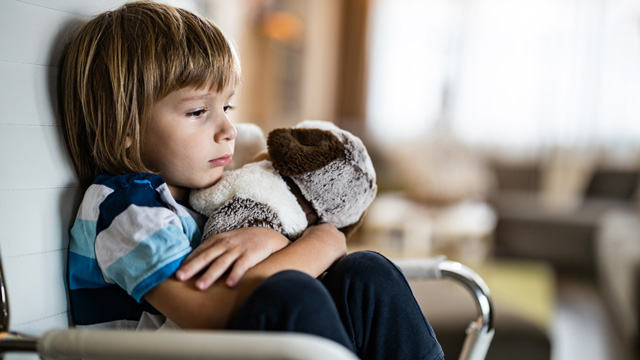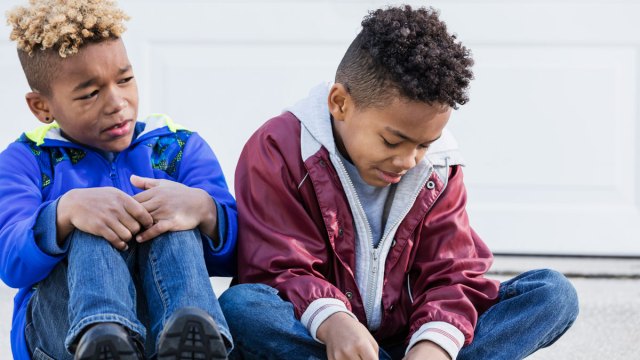The birthday invite didn’t come. They didn’t get the part in the school play. Their best friend moved away. Sound familiar? As parents, we have the (unpleasant) task of watching our kids learn the same life lessons we did in our childhoods. It can be hard to resist the urge to make sure they never have to experience the frustration or sadness that comes with not getting what they want, but disappointment is a healthy emotion for kids and can contribute to their social and intellectual development, as noted in Psychology Today. The caveat? It only works if kids understand that being disappointed at times will help them achieve their goals in life. And that’s where we come in.
Even if they do understand (or at least try to), that doesn’t mean it feels good or comes easy. That’s why we’ve enlisted a few experts to offer tips for parents when it comes to helping kids learn how to deal with disappointment.
1. Empathize with Their Feelings
Licensed professional clinical counselor Melissa Marote says that, first and foremost, it’s essential to validate your kids’ feelings; really empathize with what they’re going through. Listen to their feelings and respond with things like, “This must be frustrating.” You should avoid compounding the negativity, however. As you discuss the things your kids are missing out on, Marote explains, try to put a positive spin on it. For example, encourage your kids to save up their excitement for all the things they will eventually get to do in the future.
2. Give Them Reassurance
Child development expert and creator of The Moodsters Denise Daniels, RN, MS, tells us that it’s important to remind kids that this is only temporary—the playdate will happen when it isn’t raining, and they’ll have the opportunity to try out for the team next season. It might be hard for young kids to picture life beyond the current day or week, but still, Daniels suggests having kids make a list of things they want to do in the future because there will always be another opportunity to try.
3. Teach Self-Calming Skills

Emotions can run high when kids are anxious and sad. Teaching kids how to calm down and manage their feelings is an essential tool for how to deal with anxiety. Marote suggests giving kids a breathing technique to oxygenate the brain and help kids think more clearly. Show your kids how to take a deep breath in and then blow out, like they’re blowing out birthday candles or making bubbles. For younger kids, blowing real bubbles is another excellent method, Marote says.
One more tip for the little kids: talking to a stuffed animal. Kids are so close and connected to their stuffed animals, which makes them a great comfort for kids who are dealing with hard feelings. Tell your kids, “Talk to your teddy bear about how sad you are,” Marote says.
4. Give Them a Choice
So, a trip to the indoor playground or a group trip with friends to a nearby amusement park is out. Naturally, your kids will be disappointed, but you can give them some power (especially when they’re smaller and they feel like they have none) by offering them a choice. “Our plans have changed, and your outing with friends has to be postponed. What if you pick the movie for family movie night and we’ll look for another day that works for the group?”
5. Redirect Focus
For kids that become very hyper-focused on negative feelings, it can be helpful to use distraction techniques when learning how to deal with disappointment, Marote says. Suggest an impromptu game of “I, Spy” or get creative by asking kids to draw a picture about how they’re feeling. Other ideas include reading a funny book or watching a silly video, asking them trivia questions, and telling them jokes. This is especially important when it’s close to bedtime and you’re trying to keep things positive before sleep.
6. Don’t Fix It

This is a hard one. Whether you want to make your kids feel better or you figure you can just take care of it (fix the toy, help find the sock, bring the forgotten homework to school), it’s more effective to act as a guide when kids are learning how to deal with disappointment, according to PBS. Ask questions that will help them troubleshoot what happened and how they feel about the problem. “How did you feel when that happened? What do you wish had happened instead? How can we turn this into something good?
7. Stick with Your Normal Routine
In times of stress, encourage kids to keep regular times of going to bed, eating meals, and doing homework, Daniels says. Having a basic plan for the day is essential because kids thrive on predictability. When something doesn’t work out, at least they’ll know what should happen down the line.
8. Find Time to Have Special Moments
If your kids are bummed because they can’t attend their friend’s birthday or their favorite ice cream flavor isn’t available or they missed the final shot on goal, take the opportunity to plan something else fun. This doesn’t mean you have to take them to the amusement park or invest tons of money; just spend quality time together and you’ll see their moods lift.
9. Don’t Underestimate the Power of Hugs
Close contact, like hugs, can go a long way to providing kids with comfort when they’re learning how to deal with disappointment. That way, they’ll know you might not fix the problem, but you’ll always be there to offer comfort. Marote also suggests encouraging younger kids to hug their stuffies when they’re feeling sad or anxious. If you’re dealing with disappointed tweens or teens, look for signs that they’re ready for a hug or having you in their personal space. If it doesn’t happen, remember that being nearby and ready to listen is just as important.
Related: 9 ‘Harmless’ Phrases That Hurt Kids More Than You Think
—with additional reporting by Gabby Cullen











